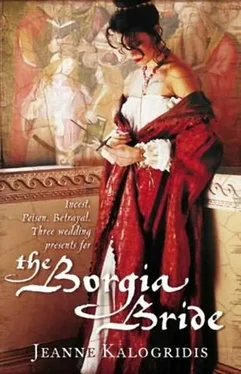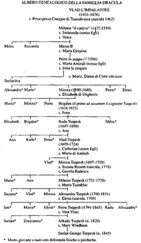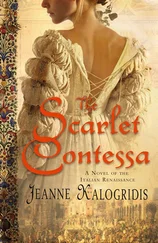Alfonso shot me a look that was at once angry and indulgent; angry, because I was overstepping my bounds by intruding on what should have been a private conversation between the two men; and indulgent, because he knew that attempting to exclude me from the meeting would be useless. He sighed, called for a servant to bring drink and some food for Captain de Cervillon, then motioned us both into the reception area.
I was worried that the Pope was softening towards Naples-and, odd as it may sound, I did not want him to invite my brother and me back to Rome; as sad as Alfonso was, I knew he was physically safe at home. Alexander’s recent change of heart had come in response to an angry letter from King Federico, who had become incensed when he heard of the Sforzas’s flight and Louis’ conquest of Milan. Our King had sent a message to Alexander: If you will not defend Naples, I shall find an ally in the Turks .
This was a startling and grave threat, for the Turks were Rome’s most feared enemies. Federico’s challenge had the desired effect: Alexander was swift to reassure him that Rome was, and would always remain, Naples’ most loyal protector. Alfonso and I sat, as our station in life required, while de Cervillon stood with a soldier’s stiff formality to give what turned out to be a report.
‘Your Highnesses, King Federico has finally managed to negotiate an agreement with His Holiness which he feels is satisfactory.’
It was clear from Alfonso’s expression that he had heard about these negotiations, and had been updated as to their content, but I had not.
‘What sort of agreement?’ I asked. It was inappropriate for me, a woman, to interject myself into the conversation, but both my brother and de Cervillon were quite used to my personality and thought nothing of it.
‘His Holiness personally guarantees the safety of the Duke of Bisciglie-and your safety, too, Your Highness-if he will return to his wife, the Duchess, in Rome.’
‘Spare me!’ I could not hide my sarcasm. ‘We all know that Alexander has invited King Louis to Saint Peter’s for Christmas Mass. Are we expected to attend with him?’
‘Sancha,’ Alfonso countered sharply. ‘You know that His Holiness has since changed his attitude after King Federico’s response. He has made his apologies and pledged his support for Naples.’
‘Still, I must insist on speaking frankly here,’ I said. ‘Who is the instigator of the negotiations? King Federico, His Holiness…or Cesare Borgia?’
De Cervillon regarded me blankly.
‘Lucrezia,’ Alfonso answered, an undercurrent of indignance in his tone. ‘She has been lobbying her father steadily since her arrival at Spoleto; she has also been in touch with King Federico via the Neapolitan ambassador. She has never given up hope.’
‘I see.’ I lowered my face. I did not wish to seem ungrateful for Lucrezia’s help; I longed to see her and Jofre again myself. Yet, for fear of Cesare, I could not believe for an instant that my brother and I could safely return to Rome.
Alfonso was surprisingly mistrustful. ‘I will consider the Pope’s offer only if he puts quill to parchment.’
De Cervillon reached into his jacket, and produced a scroll sealed with wax. ‘Here is the writ, Duke.’
Alfonso broke the seal and unrolled the parchment; a look of surprise dawned over his features as he read to the end of the document. ‘This is His Holiness’ signature.’
‘It is indeed,’ de Cervillon verified.
I insisted on studying the writ myself, despite the fact that I knew any promises contained therein were worthless. It guaranteed my safety and Alfonso’s, should we choose to rejoin our spouses in Rome. In addition, Alfonso was to be granted ‘compensation’ for any inconvenience in the form of five thousand gold ducats, and additional lands once belonging to the Church were to be added to his and Lucrezia’s estate in Bisciglie.
I, being merely Jofre’s wife, was offered nothing.
I handed the document back to Alfonso with a sense of dread. I knew, from the lovesick hope in his eyes, that he had already made up his mind to return. It had only been a matter of time.
My brother rolled the parchment back up. ‘I appreciate your bringing this to our attention, Captain. Please thank the King for all his efforts on our behalf; but at this time, I require some time to consider His Holiness’ offer.’
‘Of course.’ De Cervillon snapped his heels together smartly and again bowed. When he rose, he said, ‘I wish to convey to both Your Highnesses the depth of loyalty and respect I possess for both of you. Please know that I would gladly surrender my life to protect you. I would not bring you such an offer were I myself not entirely convinced of its genuineness.’ There was an integrity, a humble goodness in his eyes and tone, that convinced me that he meant from his heart every word he uttered. He was too kind, I thought, too excellent a human being to have to serve the likes of the Borgias.
‘Thank you, Captain,’ I replied.
‘You are an uncommonly fine man,’ Alfonso told him, ‘and we have and will always hold you in the highest esteem.’ He rose, indicating that the meeting was at an end. ‘I will notify King Federico and His Holiness of my decision within a few days’ time. And I will remark to them both, Captain, on the excellence of your attitude and your service.’
‘Thank you.’ De Cervillon bowed again. ‘May God be with you.’
‘And with you,’ we echoed.

Alfonso could not bear to wait even the few days he had mentioned to de Cervillon. That night, he composed three letters-one to King Federico, one to His Holiness, and one to his wife-saying that he would rejoin Lucrezia as soon as the Pope gave him leave.
I went riding again the following morning-this time alone, intentionally slipping away from Donna Esmeralda and my servants and guards. I had a task to perform, and was in no mood for company.
I rode inland, away from the harbour and the smell of the sea, to where the land was dotted with foliage and orchards. I rode toward Vesuvio, the now-stilled volcano, dark and massive against the blue sky.
Twice, I took wrong turns; the landscape had changed over the years. But instinct eventually guided me back to the ramshackle cottage built into the hillside. There was no donkey braying now, but a silent mule, and even more chickens, wandering freely in and out of the open doorway.
I stood on the threshold and called: ‘Strega! Strega!’
There was no answer. I stepped inside, ducking my head at the low ceiling; sun streamed in through the unshuttered windows. I tried to ignore the spider webs in every corner, and the chickens perched atop the crude dining-table; chicken dung covered everything, including the straw mattress in the corner.
‘Strega!’ I called again, but all was silence; disappointed, I decided that she had probably died years ago.
I turned to leave; but before I did, instinct bade me try one last time. ‘Strega, please! A noblewoman has dire need of your services. I will pay handsomely!’
Someone stirred in the inner chamber built into the hillside. I drew my breath and waited until the Strega appeared.
She stood in the dark portal leading back to the cavern, still dressed entirely in black and veiled. In the streaming sunshine of the outer room, I could see she had grown gaunt. Her hair had gone silver, and though one eye remained amber, the other was opaque, milky white.
The woman regarded me with her good eye. ‘I have no need of your money, Madonna.’ She held an oil lamp in her hand; without further comment, she turned and retreated back into the chamber hewn from the cavern. I followed. Once again, we passed a feather bed-still clean and grandly appointed-and a large shrine to the Virgin, the altar covered in thorny roses.
Читать дальше
Конец ознакомительного отрывка
Купить книгу













